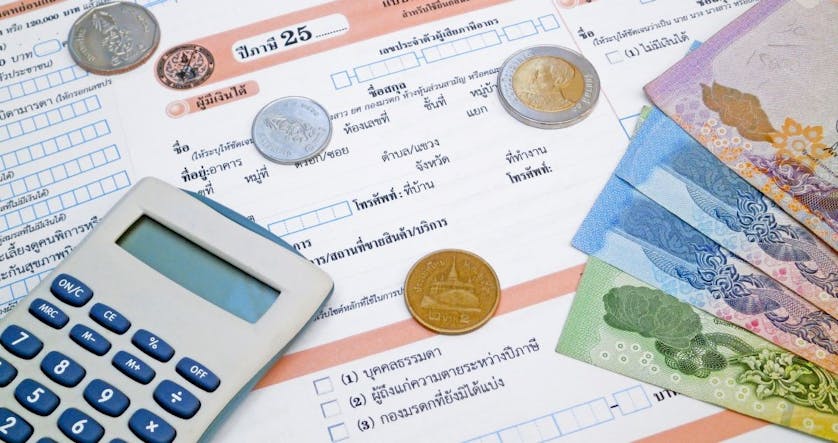
Since their announcement last September, the changes to the tax rules have been a hot topic among expats. It’s no surprise—these changes are the most significant since many expats arrived in Thailand. For many, this means a new responsibility to file a tax return, and for some, it could significantly increase living costs.
In this article, we review the changes and advise on how to meet your new obligations.
Key Changes Effective 2024 Income Remittance Taxation
- New Rule: Any income earned overseas and brought into Thailand is now potentially taxable, regardless of when it was earned. This closes a previous loophole that allowed tax-free remittances if the income was earned in a different year.
- Old Rule: Previously, only income remitted in the same year it was earned was taxable.
Minimum Reporting Threshold
- You need to file a tax return if your assessable income exceeds 120,000 baht per year (60,000 baht if from bank interest). This means even modest overseas pensions or investment incomes could require a return.
Who is Considered a Tax Resident?
- You are considered a tax resident if you stay in Thailand for more than 180 days within a calendar year. This means you are subject to Thai tax laws on both local and remitted income.
Income Types and Their Tax Implications
- Remitted Income: Any funds sent to Thailand from abroad must be reviewed for tax implications.
- Assessable Income: Income that must be declared on a tax return, excluding exempted funds under Dual Tax Agreements (DTA) or Thai Revenue Department (RD) rules.
- Taxable Income: Assessable income minus Tax Exclusions, Deductions, and Allowances (TEDA).
Key Exemptions and Deductions
Thailand offers generous exemptions and deductions that can significantly reduce your taxable income.
Key allowances include:
- Personal Allowance: 60,000 baht for self and spouse.
- Over 65 Exemption: 190,000 baht.
- 50% Pension Deduction: Up to 100,000 baht.
- Zero Rated Band: The first 150,000 baht of assessable income is tax-free.
Specific Income Categories
- Pensions:
- US Social Security: Exempt from Thai tax under the US-Thailand DTA.
- UK Pensions: Public sector pensions are taxed only in the UK. Private sector pensions may be taxable in Thailand.
- Capital Gains:
- Gains on assets sold before moving to Thailand are not taxable.
- Most capital gains are taxed as ordinary income, with certain exemptions for listed securities.
- Dividends:
- Subject to a 10% withholding tax if received from a Thai company.
- Rental Income:
- Taxable unless exempted by a DTA.
- Gifts and Inheritance:
- Gifts exceeding certain thresholds are subject to PIT.
- Inheritance exceeding 100 million baht is taxed at 10% (5% for direct descendants).
Filing and Compliance
- Tax Filing: Returns must be filed between January 1 and March 31 of the following year.
- Self-Declaration: Thailand’s tax system relies on self-declaration without the need for supporting documents when filing. However, proof must be retained for potential audits.
- Penalties: Failure to file or pay due taxes can result in severe penalties.
Recommendations
- Research Your Situation: Be careful researching online because there is lots of out-of-date information. This page answers hundreds of questions from expats and is a useful up to date resource.
- Seek Professional Advice: Consult a Thai CPA or tax expert to ensure compliance and optimise your tax situation.
- Keep Detailed Records: Maintain records of all income and remittances to substantiate your tax filings.
Summary of Key Points
- Tax Year: The tax year is the calendar year.
- Tax Filing Deadline: Returns must be filed before March 31 of the following year.
- Income Remittance: Only income remitted to Thailand is potentially taxable.
- Tax Residency: You must spend more than 180 days per calendar year in Thailand to be considered a tax resident.
- Double Taxation: Some income may be taxed at a different rate, but there is no double taxation.
- Tax Returns: Filed using the honour system without supporting paperwork.
International tax By understanding and preparing for these changes, you can ensure a smooth transition into Thailand’s updated tax landscape.
Are the Tax Changes Going Ahead?
There has been much chatter that the changes are not yet confirmed, and complaints that there has been little information about the change. However, as things stand, the Revenue Department has been clear that the changes are effective from January 1, 2024.
For official confirmation, you can refer to this article covering announcements by the Revenue Department. Additionally, this video features Khun Nathanan Junprateepchai, a legal expert from Thailand’s Revenue Department, explaining the changes to His Excellency Mr. Pedro Zwahlen, Ambassador of Switzerland.
Despite the ongoing discussions and the slow dissemination of detailed information, it’s essential for expats to prepare and comply with the new regulations. Stay updated with official announcements and seek professional advice to ensure you meet your obligations under the new tax regime.
In conclusion, while there may still be questions and adjustments in the coming months, the implementation of these tax changes is confirmed. Being proactive and informed will help you navigate these changes smoothly and avoid any potential issues.
By understanding and preparing for these changes, you can ensure a smooth transition into Thailand’s updated tax landscape.